CLAS 353
September 12, 2024
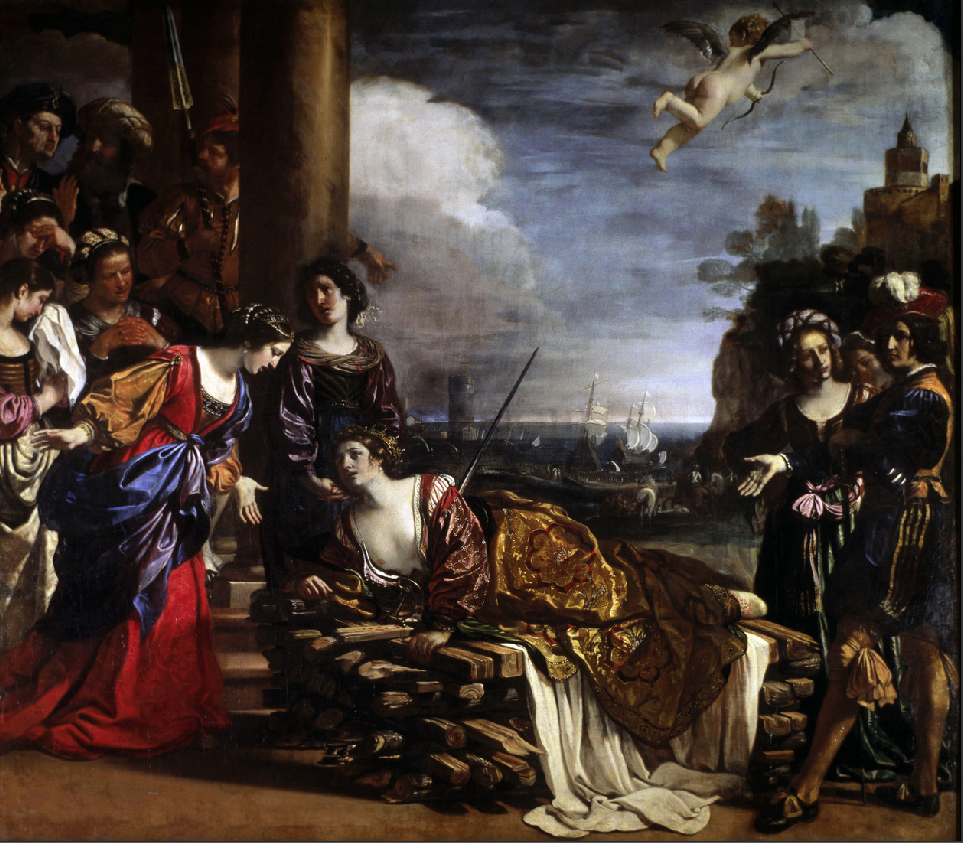

L: Guercino, Death of Dido (1631); R: Dido's pyre (illustrated medieval manuscript of Vergil)
Aeneid 4 (cont.): "Fall of Carthage": Aeneas & Trojans (re)inflict their city's trauma on Carthaginians?
Aeneid 4.667-71
Houses groaned with grief and women's wails,
and the sky echoed the clamor, as if Carthage
or ancient Tyre were falling, and the enemy
were in the city—raging fires rolling through
the homes of men and temples of the gods.
- Dido's curse (aetiology for Punic Wars): “Rise up from my bones, unknown avenger, / hunt the Dardan colonists with flames and swords", 4.625-6)
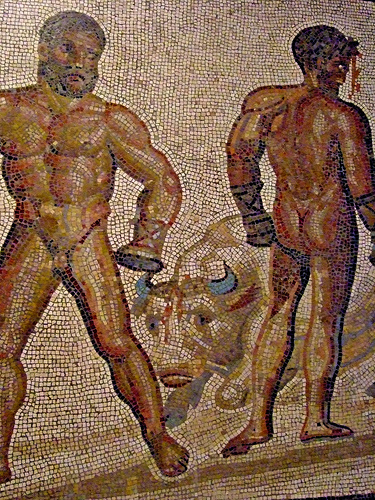
Aeneid 5 boxing mosaic, Roman France (2nd century CE)
Aeneid 5
- Funeral Games for Anchises in Sicily (cf. Greek athletic games for Patroclus, Iliad 23): Romanization, e.g. boat-race (cf. Augustus’s Actian Games) replaces Homer's chariot race (chariot simile, 5.144-7); mock equestrian battlelines of young elite as in Augustus's Rome (aetiology)
- disturbing undercurrents: boxing match of Dares & (Sicilian) Entellus; Roman “brass knuckles” (5.405), Entellus wins – violence (cf. Aeneid 7-12)
- foreshadowing of "deadly" Aeneid events:
(1) Gyas throws helmsman overboard (end of Aeneid 5?)
(2) Nisus slips in sacrificial blood & helps Euryalus win foot-race (cf. Aeneid 9)
(3) equestrian formations ("Just so the Labyrinth in high Crete, they say, / was woven of blind walls, its paths an enigma / of a thousand forking ways that foiled all clues", 5.588-9)
flashback: Ascanius' horse?
- Juno/Iris > Trojan women burn the ships ("They deplored the many reefs / and voyages that faced their weary people still. / Sick of hardship, they longed to settle" 5.615-17); 7 years wandering
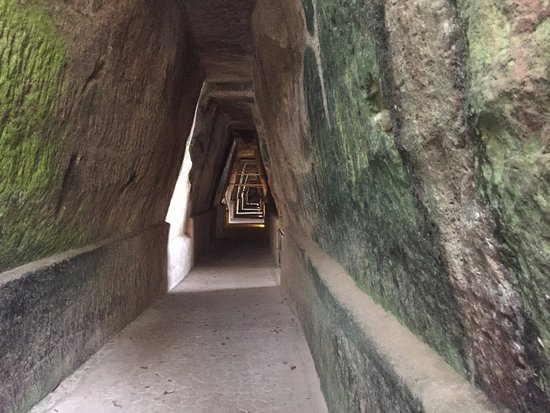
Excavated entrance to Sibyl's Cave in Cuma, Italy (today)
- Anchises appears to Aeneas (Sibyl, underworld, Italy): "But first, / come to Dis's hellish home . . . You'll learn about your people and your city" (5.731ff.)

- death of Palinurus: Neptune demands sacrifice for Trojans' safe passage to Cumae > transition to Aeneid 6
Aeneid 5.852-63 (Sleep in disguise appears to Palinurus)
He held the tiller tight, not letting go,
and fixed his eyes upon the stars above.
Then the god shook over him a branch that dripped
with Lethe's dew and drugs of Stygian strength. [Lethe, Styx rivers]
It shut his swimming eyes against his will.
He'd hardly slumped in unexpected rest
when Sleep bent over him and pitched him in the sea.
As he fell, he ripped the rudder from the stern,
calling often on his friends, but unheard.
Sleep rose on his wings into the sheer air
and the fleet sailed on as safely as before,
unperturbed, as father Neptune had assured.
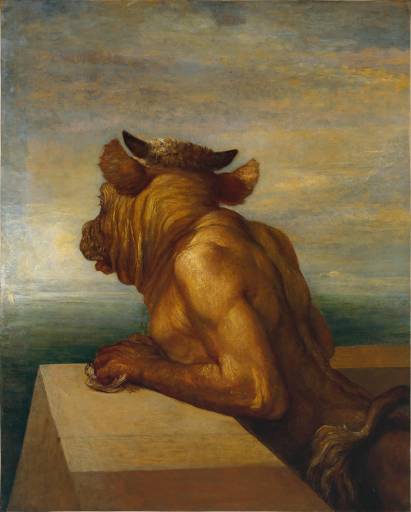
George Frederic Watts, The Minotaur (1885)
- Trojans reach Italy (Cumae): ekphrasis of temple doors of Apollo (Sibyl)
Aeneid 6.14-33 (narrative sculpture, narrative transitions)
It's said that Daedalus, fleeing Minos' kingdom, [Crete]
trusted himself to the sky on sweeping wings,
taking the usual passage to the frosty
North. At last he floated down on Chalcis' peak.
Back on land, he pledged Phoebus his wings—
his oars for flight—and built a lofty shrine.
On its doors he carved Androgeos' death
[son of King Minos, killed in Athens]
and the Athenians who who paid an awful price,
seven sons each year: an urn holds the lots.
Facing this, the land of Crete soars from the sea.
Here's Pasiphae's ruinous passion for a bull, [wife of Minos<>bull (with Daedalus' help) > Minotaur]
their stealthy coupling, and their son, the hybrid
Minotaur, a monument to awful lust.
Here's his lair, the labyrinth of no return.
[labyrinth<>underworld]
But its builder Daedalus took pity on
a princess' love, and solved the tangled turns, [Ariadna, daughter of Minos, falls in love with Theseus]
guiding Theseus' blind footsteps with a thread.
Icarus, you'd be here too, if grief allowed. [Icarus, son of Daedalus]
Twice your father tried to carve your fall in gold,
twice his hands fell from his work.
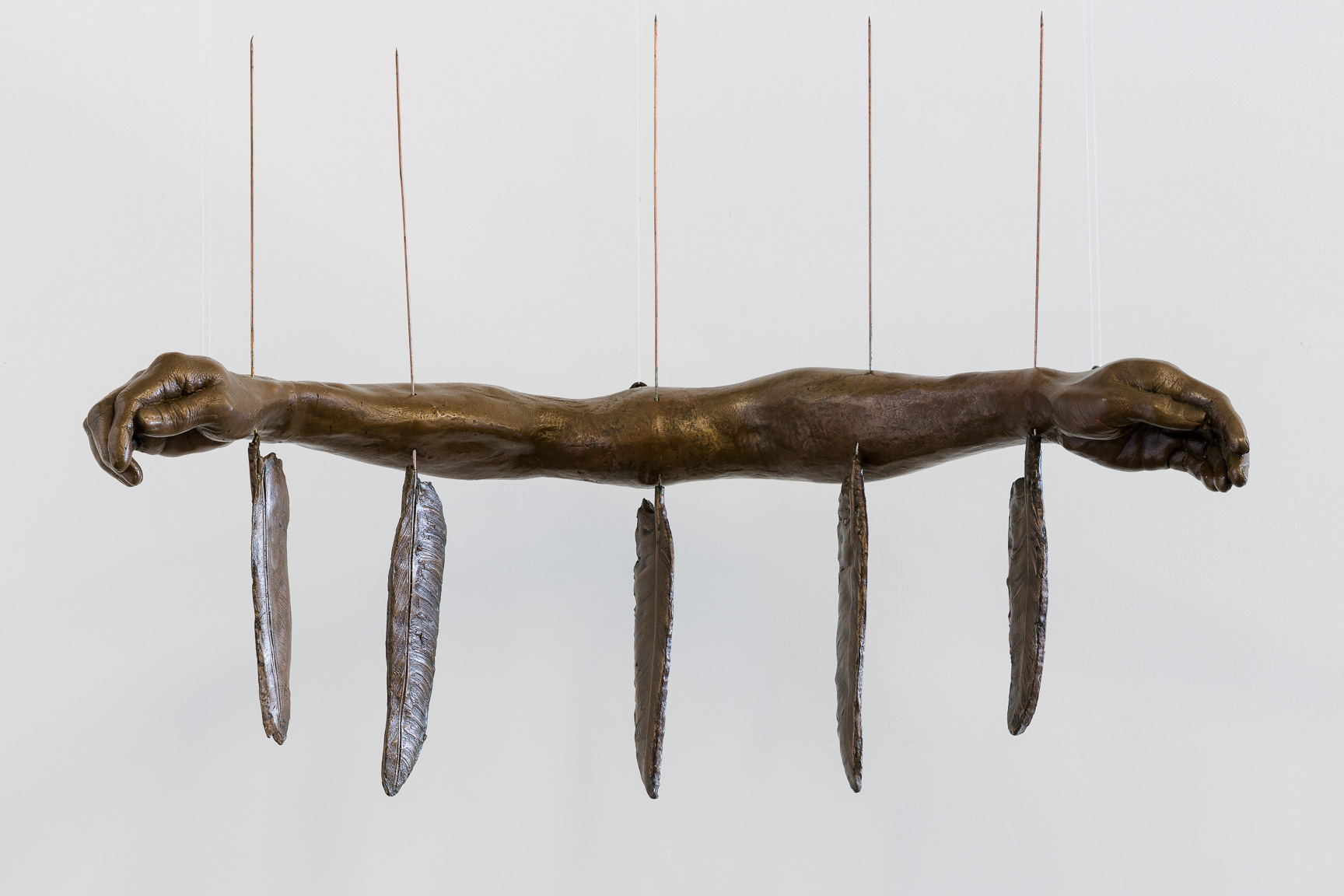
Michael Richards, Winged (1999)
[Flight & fall of Icarus: "The concept of flight as both freedom and surrender all attempt to open a metaphorical space into which the viewer can be seduced. This space allows for an examination of the psychic conflict which results from the desire to both belong to and resist a society which denies blackness even as it affirms." – Michael Richards (perished 9/11/2001, 92nd floor of WTC North)]
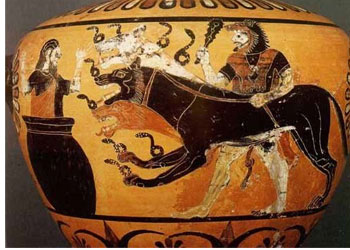
Cerberus & Hercules (black-figure hydria, ca. 530 BCE)
- typical elements of heroic journey to underworld (katabasis, e.g. Apocalypse Now) = world of the dead:
(1) hero given a charge/sent on quest
(2)
boundary is crossed (often water)
(3) hero has a guide
(4) underworld has a powerful guard
(5) labyrinthine landscape is navigated (dystopia)
(6) hero brings gift/benefit/knowledge back to land of living
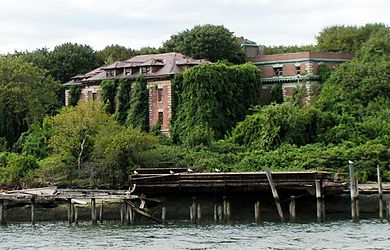
Remains of Riverside Hospital, North Brother Island
Abbi in Broad City (2014-2019) retrieves a package on North Brother Island
Journey to Staten Island in Girls (2012-2017)

- Aeneas's complex katabasis (Homer, Odyssey 11 + Plato, etc.): in Odysseus' footsteps – Circe's instructions, sacrifice, necromancy, blood to shades; Tiresias's prophecy, conversation with mother, parade of heroes' wives & daughters) - what does Odysseus learn?
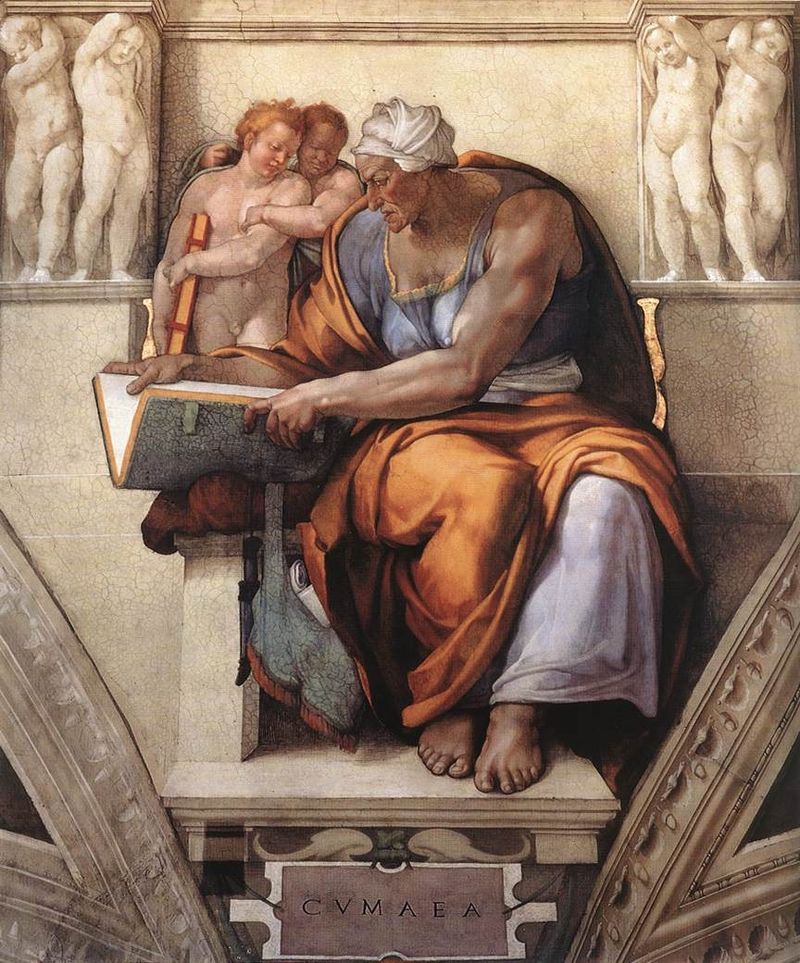
Michelangelo, Cumaean Sibyl (Sistine Chapel, 1508-1512)
- Sibyl's prophecy: "I see brutal wars / and bloody torrents frothing in the Tiber . . . In Latium you'll find a new Achilles" (6.86ff.)
- Aeneas's first test: golden bough (magical talisman, "He snapped it eagerly / as it held on", 6.210-11)
**GROUPS**
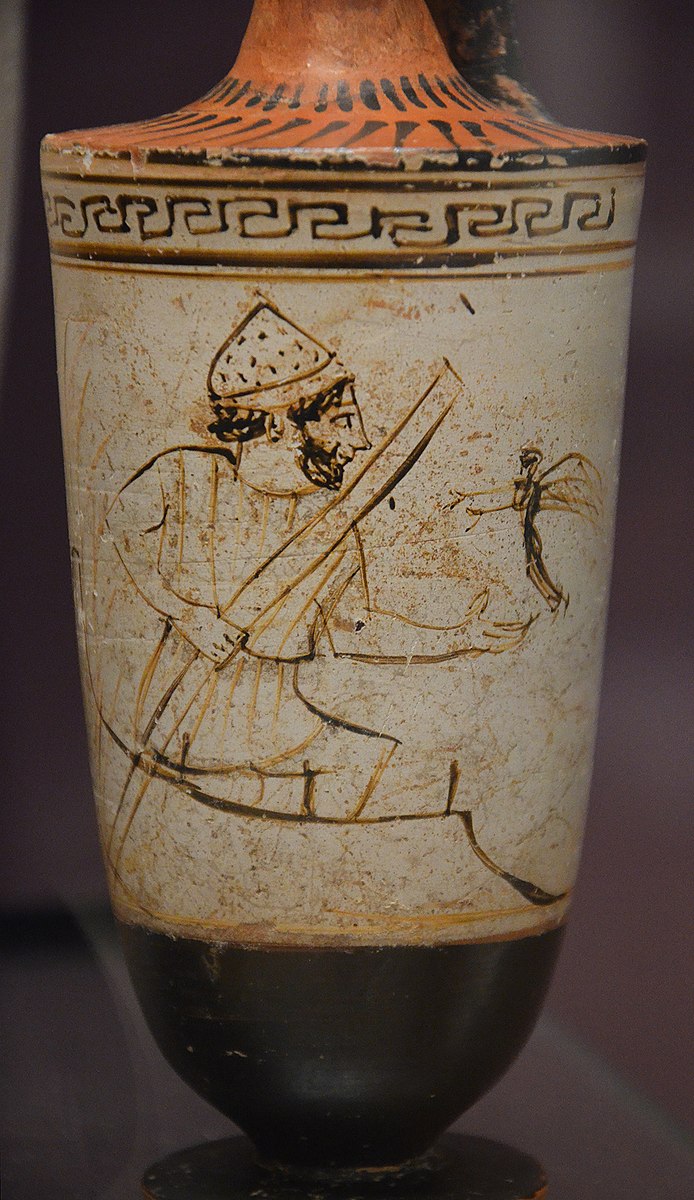
Charon (Attic lekythos, 500-450 BCE)
- Dido in "Fields of Mourning" with "those whom heartless love consumed / with cruel pining" (6.440ff.): her reaction to Aeneas ("as hard flint or a rocky crag of marble ...", 6.471ff.) – cf. Odysseus' meeting with Ajax, Odyssey 11.543, "Only the soul of Telamonian Ajax stood off / at a distance from me ...")
- ultimate destination: Anchises & Aeneas review parade of future Roman historical figures – Romans decended from Silvius (not Iülus, 6.760ff.)
Aeneid 6.847-53 (Anchises explains the Roman/Augustan mission in the world)
"Others, I believe, will beat out bronze that seems
to breathe and chisel living faces out of marble.
They'll excel in pleading lawsuits, and they'll trace
the heavens' paths and chart the rising stars
You, Roman, remember your own arts: to rule
the world with law, impose your ways on peace,
grant the conquered clemency, and crush the proud in war." [cf. end of Aeneid]
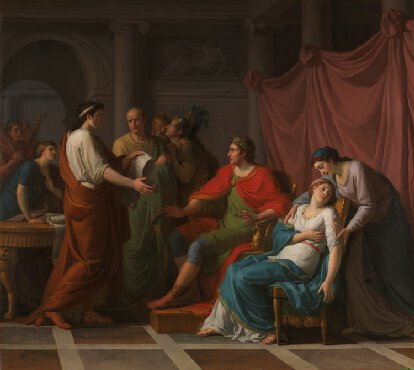
Tailasson, Vergil reading the Aeneid to Augustus and Octavia (1787)
Aeneid 860ff. (the parade continues)
Aeneas saw a handsome young man
near Marcellus, in bright armor, but his face
showed little joy, and his eyes were downcast.
He asked Anchises: "Who is that who goes with him? [Marcellus, nephew of Augustus, d. 23 BCE)
A son? A son's son from this noble stock?
How his comrades cheer! What a fine impression!
But black night flaps around his head with her grim shadow."
Then tears welled in Anchises' eyes. "My child,
don't ask about the grief of your people . . .
. . . What mighty groans of men the Field of Mars
will send to our great city! What a funeral
you'll see, Tiber, as you pass his tomb's fresh soil!"
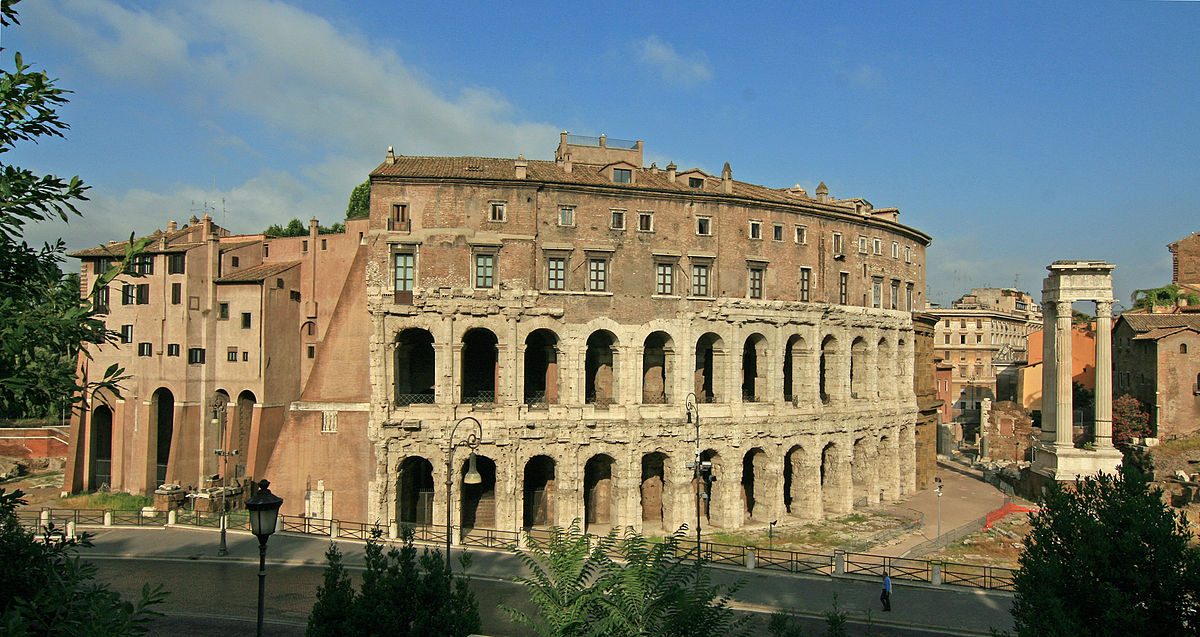
Remains of Theater of Marcellus in Rome today (built in 13 BCE)
- exiting the underworld: gates of horn & ivory: cf. Penelope's dream of 20 geese & 1 eagle, Odyssey 19.562ff. (ivory gate for deceptive dreams, "their message is never accomplished . . . dreams that come into the open through the gates of the polished / horn accomplish the truth for any mortal who sees them"); clash of Vergil's (optimistic) public & (skeptical) private voices?
Aeneid 6.893-8
There are twin Gates of Sleep. One, they say, is made
of horn, and lets true visions pass through easily.
The other gleams with complex work in ivory,
but through its shades send lying visions to the light.
Anchises and the Sibyl brought Aeneas
to this gate and sent him through.













